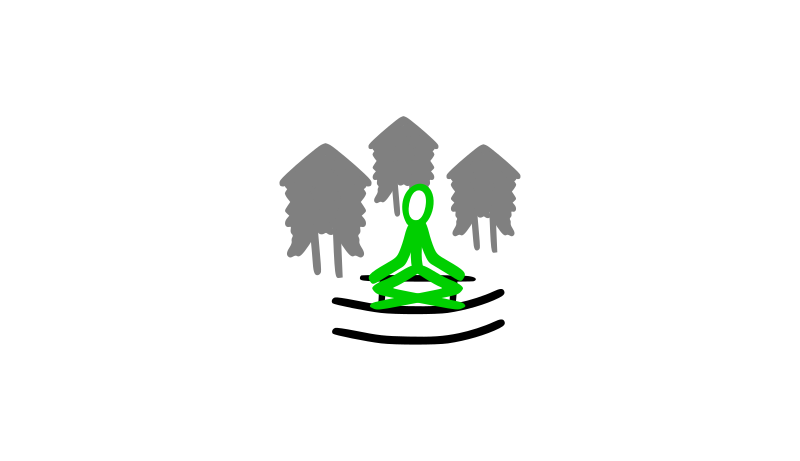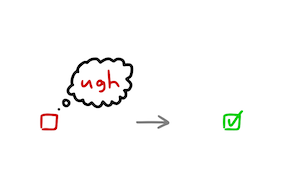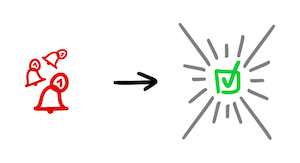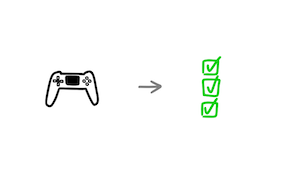We need a space for reflection

Modern life is busy — so many things to do: people to meet, hobbies to try, TV series to watch...
All of these activities have one thing in common: more information coming in. More experiences, more sensations, in short, more inputs. Even if we somehow find ourselves with a bit of free time, we're all too eager to reach for our phone and scroll feeds, messages, or channels. For many of us, this is an unconscious habit at this point.
And in all that busyness, we forget to do a thing that has the power to actually improve our lives: reflection.
Reflection = anti-dote to stagnation
You might be asking: Why bother with reflection? What sort of reflection?
The short answer to the first question is that reflection is the antidote to stagnation, a problem you may be all too familiar with. Here’s why:
Many of us spend the whole day going from one activity to the next without significant pauses. Wake up, check the phone, make yourself a cup of coffee, check the phone again, sit down, open laptop, check the news, check your inbox, check your to-do list, reply to... From one activity to the next, at a frantic pace, without stopping, without thinking, just responding to messages and notifications automatically.
The typical day is a whirlwind of habitual activity and reacting to external emergencies. Then we fall asleep while listening to a podcast (yet more inputs) and repeat the same routine tomorrow.
There is no time left to look back on one's day and think about how to make things better. And that is a problem. In order to learn and adapt, reflection is necessary.
Here's the Kolb model of learning to help us understand why:
- Experience
- Reflection
- Conceptualization
- Experimentation
You try something new, then you reflect on that experience, then you figure out what to do next about it. What worked? What didn't? Is it worth repeating the experience? If so, the next step is testing. You make a change, and then you do it again. This is how we learn in the real world.
But what happens now is that it’s easy to get stuck at the level of experience. If we don't take a moment to reflect, we won't change. We'll continue doing the same things, over and over again, only repeating established patterns of behavior.
Without reflection, we accumulate more and more of these patterns (even though they may be very harmful), without a conscious chance to assess and adjust.
Here’s a concrete example for you:
One day you eat at 11PM even though you said you wouldn't eat after 10PM. The next day, you're too busy during the day to think about whether that's good or not. You eat after 10PM again. And the next day, again. That's how a new pattern is created. Like my friend Ondrej said: once is an exception, twice is a new pattern.
If we act automatically every day, our standards will erode bit by bit.. Too much Instagram one day, fast food the next, skipped workout the next,... No, course-correction = our overall mental and physical state starts slipping.
This is why reflection is essential—it allows us to comb through the events of the day, find the deviations from our standards, and consciously choose to do something about it. Reflection is what allows us to be deliberate about how we spend our day.
That's why it's vital to make a place for it in your daily routine. Or rather, outside of it.
Create a space for reflection
Now, here's the tricky thing: our devices are like attention magnets. If you're home, it's so easy to plop down on the couch, grab your phone and scroll and watch. Screens are omnipresent in almost all environments. If you have a phone, a laptop, or a smartwatch, you can be connected to ubiquitous streams of information: social media posts, videos, messages...
Every one of these devices acts as an antidote to actual deep reflection, it represents just more and more consumption. So, if you try to use an existing space for reflection, you'll likely fail. 5 minutes in, you'll reach for your phone, and poof, any useful thoughts will vanish.
In order to actually reflect with any significant frequency, we need to use the most effective behavior design lever available: our environment.
Let’s get to the practical part of this article.
Find a physical space for reflection
We humans naturally create places for the things we wish to do. Kitchen. Gym. Bedroom. Each place is an environment that makes doing certain activities easier. So, if we want to reflect more, it makes sense to find a place that inspires reflection and makes it easier.
This doesn't have to be complex - here are some examples of reflection-inspiring environments:
- a bench in a park or near a river
- a table at in a cozy coffee shop
- a balcony or a terrasse
Take a moment to think about your surroundings right now.
What place could you go to to just stare into the distance and think, uninterrupted?
Many of us have a place that would be suitable for reflection within 5 or 10 minutes of walking. Even if you can't think of an easily accessible space in your vicinity, you can create a space like that for yourself within your house or apartment.
Maybe you have an armchair that you haven't used in a while? Or perhaps you have a porch or a balcony? Any place a bit away from your usual surroundings will do. No need to overcomplicate it.
How to reflect
Let's get even more specific and answer a question that might have crossed your mind:
What to actually do once you get there? How to reflect?
The obvious answer is: nothing. Just do nothing and let the mind do its thing. The obvious problem is that many of us are not used to doing nothing. Endless busyness is the default state for many of us. It's hard to do nothing and just think.
If you feel like you fall into that category, a background activity can be helpful.
Background activity: have something to do while you think
A background activity is anything that keeps your mind occupied, but leaves enough bandwidth to actually think.
One of the most frequent background activities (but most definitely not the healthiest) is the cigarette break. Go to a balcony, smoke, think about life. If you're not a smoker, a different activity is needed: sipping a beverage of some sort (tea, coffee, whiskey), stretching, or walking. Of course, if you're capable of just sitting and staring into the distance without doing anything, you're good. If you can't sit still, a casual stroll is perhaps the best option.
There's just one rule to keep in mind when choosing a background activity:
Avoid screens.
Put your phone in your backpack or in another room. Don't attempt to reflect with a screen in front of you. That almost always fails. No screens. Screens destroy any attempt at deep, meaningful reflection.
A bit of structure to make reflection useful
So now you've thought of a place to reflect, and have a background activity picked if you don't think you can just sit and stare into the distance.
The last tip for you is that once you're sitting on a bench in a park, it helps to have a question to anchor you:
- What do I actually want to do right now?
- What unfinished business have I not dealt with yet?
- What do I need to do today? (more of a morning question)
- How did today go? (evening)
- How's my life going right now? (general)
These simple questions are great, because they focus your thoughts towards what you want to change. Maybe it's time to stop eating fast food, stop scrolling TikTok, start reading...
15 minutes spent reflecting on any one of these questions can be the difference between making a change, and continuing down a path of unproductive bad habits.
Reflection: the routine to improve all other routines
It's never been easier to spend our days mindlessly. Modern technologies are not designed to help us spend our day in a meaningful way. In fact, they often go directly against that goal. Find a space outside your routines to reflect and realize how to improve your life. You don’t need more YouTube how-to videos you’ll never use, you just need to reflect.



